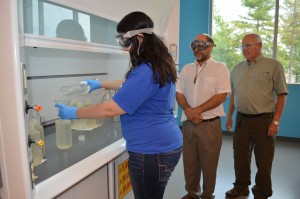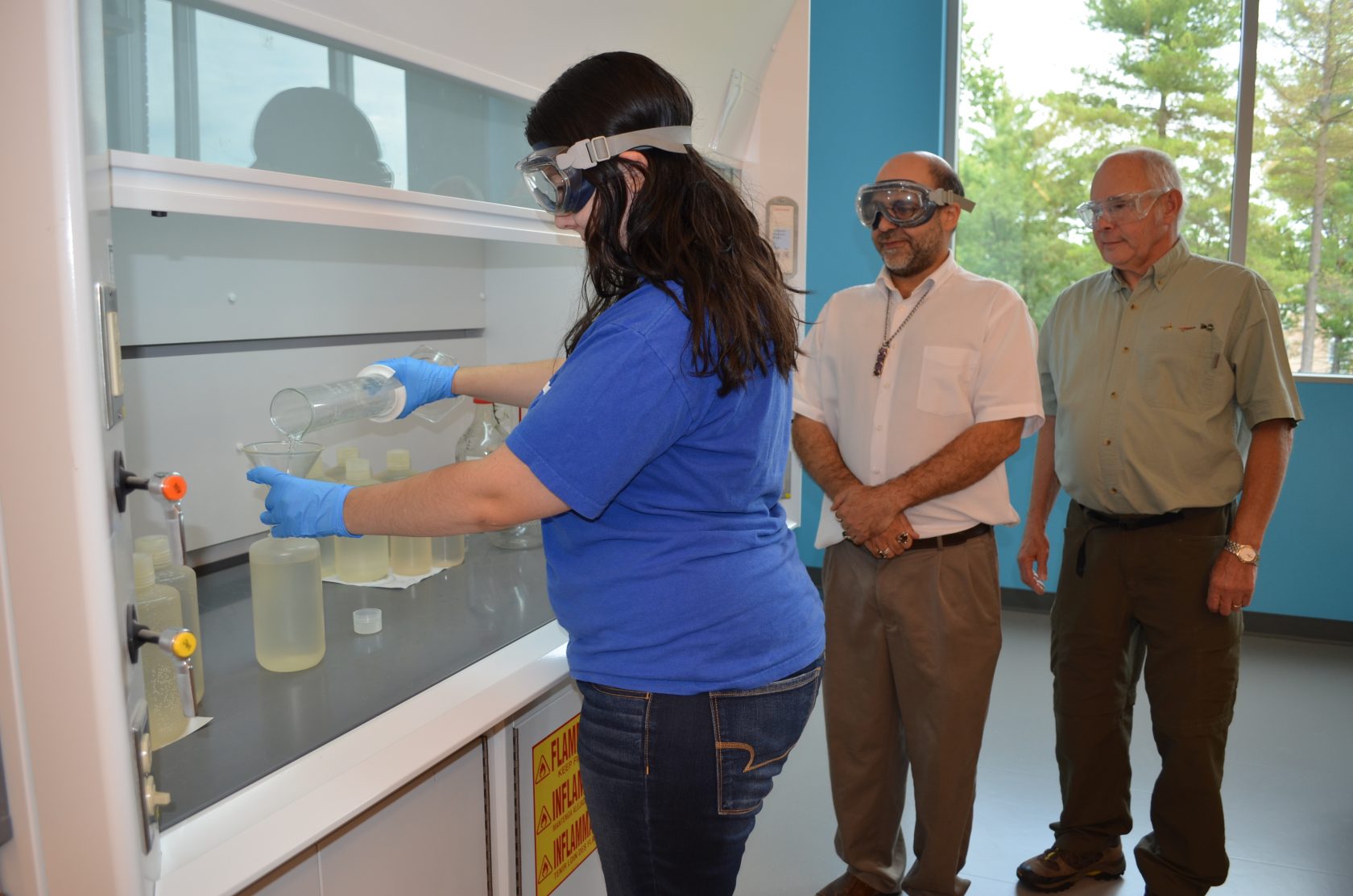WESTFIELD-Deanna Domenichelli, a senior at Westfield State University, is passionate about water.
Domenichelli, a native of northern California, understands and has seen first-hand the devastation of water scarcity.
“Water is life and there are so many issues surrounding water today,” said Domenichelli. “Water scarcity is huge and with climate change happening we will have to find a better way to manage and conserve our water.”

Deanna Domenichelli, a senior at Westfield State University, sterilizes sample bottles prior to the collection of river water samples. Aaron O. Reyes, Ph.D., associate professor, Chemical and Physical Sciences, at Westfield State, and Bill Rose, president of the Westfield River Watershed Association, look on.
In a few months, Domenichelli will graduate with a Bachelor of Science degree in environmental science and a minor in biology. While she is wrapping up her classes, she has also been hired by the Westfield River Watershed Association (WRWA) for its water quality internship program.
Aaron O. Reyes, Ph.D., associate professor of Chemical and Physical Sciences at Westfield State, and a WRWA director, oversees the project.
The first Westfield River water testing was done by Domenichelli and Reyes on Sept. 10 and included several collection sites including in Huntington near the Rapids Restaurant, two sites along Route 20 in Russell, one area before the Tekoa Country Club, the Little River near its confluence with the Westfield River, Great Brook on North Westfield Street, and along the dike at the West Springfield/Agawam line near the Eastern States Exposition.
Domenichelli said that the entire process of water sample collection takes approximately six hours.
“This is an awesome opportunity to work on a local meaningful project for the association,” said Domenichelli, who will return to the sites on Oct. 1 with Reyes for another round of testing. During her internship, Domenichelli will analyze and interpret her data, write a report and present her findings to the WRWA early next year.
Bill Rose, president of the WRWA, said he is pleased with the results he has heard to date from both Domenichelli and Reyes.
“The internship is important so we can monitor the cleanliness of the river,” said Rose. “Pollution can come from many areas including industry, people in the river or leaving their trash behind, and from fertilizing fields. We monitor the river because it can give us warning signs.”
Reyes echoed those sentiments.
“We’re measuring naturally occurring elements that get into the river bed,” said Reyes. “If the measurements are way too elevated, we know there is an issue to address.”
While Domenichelli has a lot of praise for all of her professors over the years, she noted that Dr. David Christensen’s Aquatic Biology class was a pivotal moment for her.
“I became really interested in aquatic ecosystems which led to more water-based courses,” she said, adding an environmental degree fit more into her needs.
“I am so grateful I found my niche and that I had a wonderful support system both at home but especially with the faculty at Westfield State,” she said.
With testing ongoing, the Westfield River is in good hands.
“The upper part of the Westfield River is very healthy,” said Reyes, noting he remains cautious in the Little River area in particular because of higher concentrations of salts found as well as film from oil due to more industry in the area. “A good test is to pick up rocks and examine the insects. The river is healthy when there are healthy micro-invertebrates. If we don’t find them we know it will take years for them to come back to the river.”
While Domenichelli debates her options after graduation including grad school, she knows her years at Westfield State provided the “spark” she needed for her future endeavors.
“I believe everyone on some level has an ingrained desire to make the world a better place,” she said. “I plan to tackle river and stream continuity issues and explore dam removal projects with all the knowledge I’ve gained from classes and my internships.”


